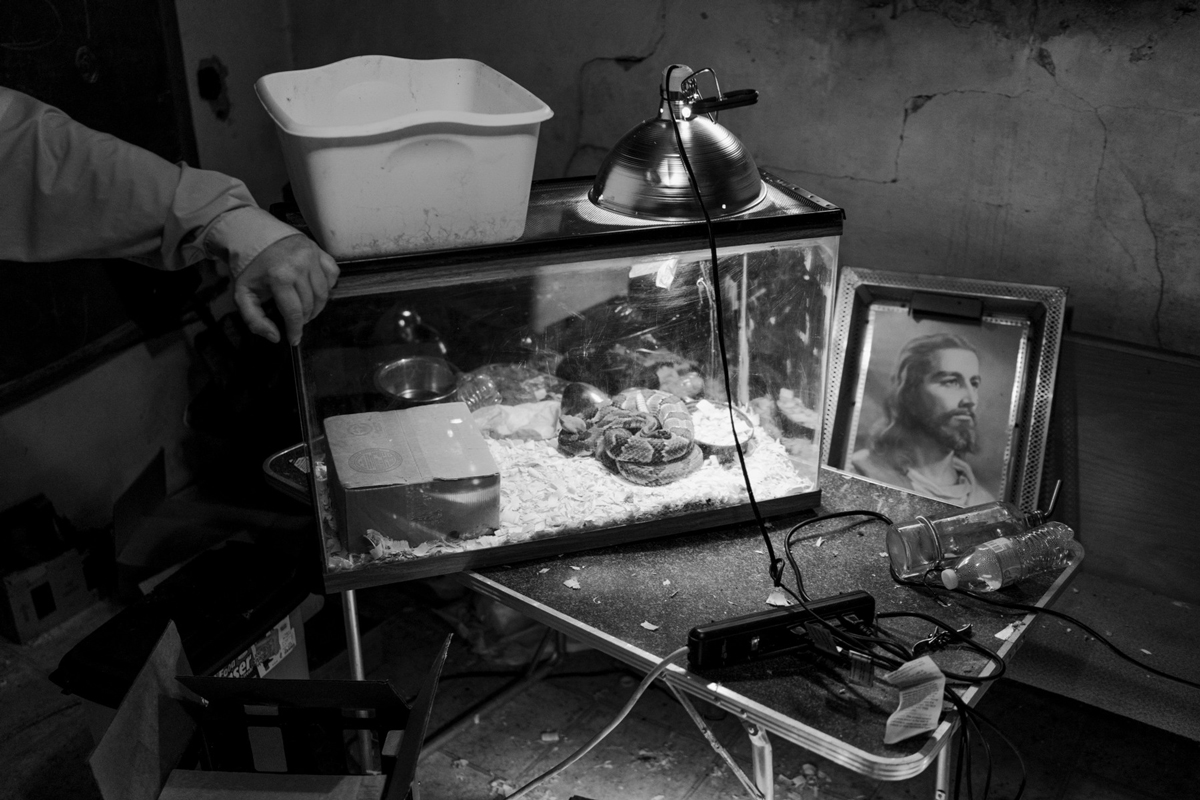The passion of West Virginia's last snake-handling church
- Text by Miss Rosen
- Photography by Robert LeBlanc

Nestled deep in the Appalachian Mountains of West Virginia lies Squire, an unincorporated community in McDowell County that takes its name from a local law enforcement officer. Although the coal industry shapes the area’s blue-collar conservative politics, McDowell County is one of the poorest in the nation.
“The land has made many people rich, but most don’t live in that region,” says photographer Robert LeBlanc. Once the natural resources have been extracted, companies ship out and abandon the communities they built, creating a virulent mix of environmental destruction and rural poverty. As is often the case when these forces collide, religion fills the void.


“Once you turn off the freeway, you begin to see churches pop up everywhere,” says LeBlanc. “As you get deeper into the mountains, the small towns you pass through are no longer than a mile long [with] no more than 100 to 150 people living in them. I remember thinking, how do they fill all these churches?”
LeBlanc would discover the answer for himself. He’s spent the past five years with pastor Chris Wolford and his family, who run the notorious House of the Lord Jesus – said to be the last serpent-handling church in West Virginia.
One of few remaining churches in the Pentecostal Signs denomination, the House of the Lord Jesus take the King James version of the Bible literally, following the Gospel of Mark 16:17-18, which extols believers to cast out devils, speak with new tongues, and take up deadly serpents for protection and healing. Snake handling is a centuries-old ritual, often involving drinking poison as a demonstration of the strength of their faith.



LeBlanc’s new book and exhibition, Gloryland, takes us inside this fabled sect. The project began as he traveled through the South, exploring a moment in American history where old beliefs and traditions are falling away under the relentless onslaught of late capitalism. On his journey, he connected with Wolford and spoke with the preacher for two months before attending his first service among the entire congregation.
“I witnessed something extraordinary that probably wouldn’t be around in another 10 or 15 years,” says LeBlanc of the services, which include music he describes as “a clash of Southern gospel, Delta blues, and folk,” as well as the legendary snake-handling rituals. LeBlanc ultimately came to feel a sense of kinship with the Wolfords despite their ideological differences, and observes their displays of devotion with reverence. “They have taught me a lot about love, family, and believing in something so profoundly that they are willing to risk their lives twice a week for what they believe,” he says.
For LeBlanc, the idea behind Gloryland is about the search for something greater than oneself – and the arrival at one’s destination after the struggle is won. “Seeing their ability to still hold onto their faith against the odds is admirable,” he says. “They have been turned into a spectacle by almost every major media outlet and online bashing never stops, but they keep their heads up. As a congregation, they are bulletproof.
“West Virginians fight all odds as a community and help each other,” he adds. “Even though the world has forgotten about them.”



Find more of Robert LeBlanc’s work on Instagram.
Enjoyed this article? Like Huck on Facebook or follow us on Twitter.
You might like

Largest-Ever Display of UK AIDS Memorial Quilt Opens at Tate Modern
Grief Made Visible — Comprising hundreds of panels made by lovers, friends and chosen family, the UK AIDS Memorial Quilt returns in full for the first time since 1994 – a testament to grief, friendship and the ongoing fight against HIV stigma.
Written by: Ella Glossop

In Medellín’s alleys and side streets, football’s founding spirit shines
Street Spirit — Granted two weeks of unfettered access, photographer Tom Ringsby captures the warmth and DIY essence of the Colombian city’s grassroots street football scene.
Written by: Isaac Muk

Remembering New York’s ’90s gay scene via its vibrant nightclub flyers
Getting In — After coming out in his 20s, David Kennerley became a fixture on the city’s queer scene, while pocketing invites that he picked up along the way. His latest book dives into his rich archive.
Written by: Miss Rosen

On Alexander Skarsgård’s trousers, The Rehearsal, and the importance of weirdos
Freaks and Finances — In the May edition of our monthly culture newsletter, columnist Emma Garland reflects on the Swedish actor’s Cannes look, Nathan Fielder’s wild ambition, and Jafaican.
Written by: Emma Garland

Why Katy Perry’s space flight was one giant flop for mankind
Galactic girlbossing — In a widely-panned, 11-minute trip to the edge of the earth’s atmosphere, the ‘Women’s World’ singer joined an all-female space crew in an expensive vanity advert for Jeff Bezos’ Blue Origin. Newsletter columnist Emma Garland explains its apocalypse indicating signs.
Written by: Emma Garland

We are all Mia Khalifa
How humour, therapy and community help Huck's latest cover star control her narrative.
Written by: Alya Mooro

